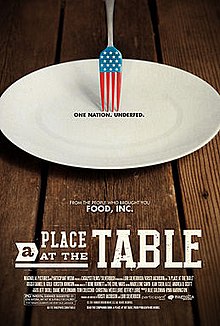 Understand how we are “One Nation, Underfed,” at our Sun, Nov. 3, 10am screening of the Jeff Bridges narrated film about hunger in America, A Place at the Table, followed by a discussion led by The Food Trust executive director, Yael Lehman. A part of our What is Your Food Worth partnership with Temple University’s Feinstein Center.
Understand how we are “One Nation, Underfed,” at our Sun, Nov. 3, 10am screening of the Jeff Bridges narrated film about hunger in America, A Place at the Table, followed by a discussion led by The Food Trust executive director, Yael Lehman. A part of our What is Your Food Worth partnership with Temple University’s Feinstein Center.
When I was in college, I was introduced for the first time to the extended Jewish Grace After Meals blessing recited by traditional Jews. I thought the Birkat Hamazon version Reform Jews recited was long, but this traditional text at least quadrupled the blessing I had heard in my youth.
As I listened, I noticed that some people at the Brandeis Shabbat dinner, omitted a verse. Instead of reciting the words, they just hummed the tune when it was time to say the line that reads: “I have not seen a righteous person forsaken, or children begging for bread.” Although the religious person might recite these words as aspirational, many Jews concerned with food justice and general fairness cannot bring themselves to say this part of the prayer. After all, one important function of prayer is the expression of our values and the inspiration to repair the world.
I found it powerful when I began to understand that immediately after eating a meal, when it’s time to appreciate the nourishment and give thanks to God, Jews were intentionally focusing on the hungry. The interpretation that leads some to omit the verse in Birkat Hamazon grows from deep Jewish understanding of gratitude and of mitzvah.
The Midrash (legend) teaches: To one for whom bread is suitable, give bread; to the one who needs dough, give dough; to one for whom money is required, give money; to one for whom it is fitting to put the food in that one’s mouth, put it in (Sifre on Parashat Re’eh). The Midrash is clear: understand a person’s need so that you can fulfill it. And isn’t the image, to put food right into someone’s mouth, striking! Would that nothing came between me and the mouth of a hungry person.
This year, our congregation is engaged in a meaningful conversation about our relationship with food. Exploring intentionality, food-sources, health, nature, social connection, Jewish tradition, and food justice, we are asking the question: “What is Our Food Worth?” In our learning, I have witnessed a blurring of the lines between these areas of our relationship with food. Food production is connected to food insecurity and food insecurity is connected to food deserts and cheap, unhealthy calories. And the list goes on.
The interconnectedness of these different aspects of the role of food in our lives is poignantly portrayed in the film A Place at the Table. As narrator Jeff Bridges says, “If another nation were doing this to our children, we’d be at war.” The eye-opening film teaches that we do not have hungry Americans because of a lack of food, but because of poverty. 50 million Americans—1 in 4 children—don’t know where their next meal is coming from. A Place at the Table tells the powerful stories of 3 such Americans who maintain their dignity even as they struggle just to eat. In a riveting journey that will change forever how you think about the hungry, A Place at the Table shows how the issue could be solved forever once the American public decides—as they have in the past—that ending hunger is in the best interests of us all (from film promotional materials).
Congregation Rodeph Shalom will screen the film, A Place at the Table, on Sunday, November 3 at 10:00 am, and The Food Trust Executive Director Yael Lehman will lead a discussion, as a part of our What is Your Food Worth partnership with Temple University’s Feinstein Center. May we join together to learn more about hunger and to discover our community’s mitzvah for food justice.
